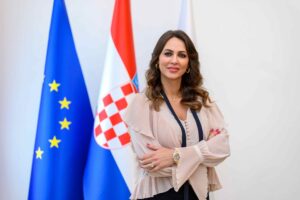Stories will drive the growth of a tourism offer that meets the high standards of guests with greater spending power.
Strategic documents of Croatian tourism guide the development of offers between standards and luxury, which is premium. This has been recognized by the Croatian Chamber of Economy, which initiated a project to bring together stakeholders in premium tourism. For Diplomacy&Commerce, Focus on Travel, Andreja Vukojević, Director of the Tourism Sector and Marketing and Communications Sector of the Croatian Chamber of Economy, states that clear criteria have been established, and every company must meet certain conditions to access the platform according to the category they belong to, adds Ms. Vukojević.

- As a small country on the Mediterranean, Croatia is already perceived as a tourism powerhouse, supported by the increasing number of tourists and overnight stays. What do you think, how much room is there for continuous growth and what are our ultimate capacities?
In many destinations, especially the most attractive ones like Dubrovnik, Hvar, Rovinj, etc., capacities during peak season are always full, and no additional growth should be expected or desired there. It’s essential to consider the sustainability of destinations, the impact of tourism on the lives of local residents, infrastructure, and the environment. This is the greatest value of the new Tourism Law, which prioritizes sustainability and allows local communities to decide the degree and intensity of tourism development. In this way, Croatia has joined many European countries that prioritize the sustainability of tourism industry. We have come a long way from the era of mass tourism and the discovery of our coast during the time of the former state, the re-affirmation after the Homeland War, and the discovery of Croatia as a small challenger in the Mediterranean, to today’s position that places Croatia alongside the largest European tourism powers. We are still characterized by our proximity to major European markets, excellent transport connectivity, and preserved nature, but with additional advantages; an increasing offer of premium content, variety, and quality of offerings. I see room for growth and capacity expansion precisely in the so-called newly discovered destinations, especially continental centers. All destinations should aim to extend the season, offer additional content, and invest in year-round air routes as a crucial factor for year-round operations, particularly in southern Dalmatia. Zagreb has long been a year-round destination, Rijeka has similar potential in synergy with its hinterland, and efforts should also be made for Split to become a year-round city break destination.
- Private accommodation is the backbone of lodging in Croatia. How many hotels of all categories are we lacking, and what needs to be done to facilitate investors to invest more in hotel accommodation?
All Croatian companies are making great efforts and investing significant resources to remain as competitive as possible in the rather ruthless global tourism market. Private accommodation in Croatia is rooted in history, and represents an authentic way of hosting guests, and it should be preserved as such. However, hotel owners, whether they are large hotel companies, camps, or boutique hotels, are often trendsetters and, due to their size and the resources at their disposal, they are crucial for the development of tourism. This is especially true when it comes to extending the season, as hoteliers invest heavily in complementary offerings and sustainability. In addition to investing in renewable energy sources and other measures to achieve greater neutrality concerning the impact of operations on local infrastructure and the environment, many hoteliers are increasingly using products from local food and beverage producers in their supply chains.
Therefore, the development of hotel offerings, especially in the high 4- and 5-star categories and in the segments of conference, health, and wellness tourism, is key to further positioning Croatia in the tourism market and ensuring the sustainability of tourism itself. Investors primarily need a predictable regulatory and tax framework, a reduction in parafiscal charges, and clear strategies from local communities, cities, and counties to plan long-term investments and development. Today, Croatia is in the Eurozone and Schengen area, and in two years, it is likely to join the OECD, which will make us even more attractive to foreign investors. Generally, I believe that a period of significant investments and the arrival of international hotel groups is ahead of us.

- As a tourist destination, one of the goals is the focus on the premium segment. Where does Croatia stand today in premium tourism compared to the competition we benchmark ourselves against, and what are our comparative advantages and potential drawbacks compared to Mediterranean countries?
If we look at our role models in the premium segment such as Italy or France, there is certainly a lot of work ahead of us, especially in positioning our offerings, improving quality, and diversifying types of accommodations; from glamping, premium vacation villas to 5-star category campsites. There is much we can learn from our Austrian neighbors who achieve excellent revenues and sales volumes in both winter and summer tourism. However, we must not forget that Croatia was perceived as a cheap family destination for sun and sea just two decades ago, and this image has significantly changed in recent years. Primarily, we need to raise awareness about the necessity of a premium offering, proper positioning, and pricing policies because something expensive cannot automatically be considered premium. Therefore, we are talking about value for money, which is a sensitive issue for today’s guests, regardless of their purchasing power. It is necessary to network stakeholders who provide this type of offering, create conditions for its enrichment, and follow trends. In the newly established platform Stories – Experience Premium Croatia, we have a lot of work ahead of us. Challenges abound, but I find professional fulfillment in the multitude of positive reactions and interest in membership; Stories is a project that Croatian tourism has been missing.
- HGK and You personally presented the Stories Platform for development of the premium segment in tourism all in one place. What does this precisely mean in practice?
The Stories platform was launched in April this year and already gathers around a hundred members. All premium service providers from the hotel and catering sector, campsites, marinas, holiday villas, travel agencies and charter companies can be included, and if interest is shown, we are also open to other segments of the premium offer.
- What is the goal of the platform and ways to apply it in practice? How to recognize the potential and use it, from the very beginning to the end user?
To begin with, we are focused on gathering as many members as possible, followed by activities such as domestic and foreign fairs, B2B workshops, study trips, education, media promotion, and the organization of promotional events in the country and abroad. Through the aforementioned activities, Stories will encourage the growth of tourist offers that meet the high standards of guests with higher paying power. In addition, we will communicate messages about the possible impact of premium tourism for the economic growth of the country and encourage the development of premium offers.
Clear criteria have also been set, each company must meet certain conditions for access to the platform according to the category it belongs to. The criteria were defined by a working group consisting of representatives of the Ministry of Tourism and Sports, the Croatian Tourist Board, the Faculty of Management in Tourism and Hospitality from Opatija, UHPA, the Ministry of the Sea, Transport and Infrastructure, and all the presidents of the Association in the Tourism Sector of HGK. In order to maintain high standards, membership will be reviewed periodically.

- What is premium tourism?
Premium tourism is the most demanding but also the most lucrative sector. It encompasses everything between luxury and standard, emphasizing excellence and quality across destinations, accommodations, gourmet offerings, and more. Estimates suggest that such offerings make up about 15% of the global tourism market, with luxury accounting for approximately 5%, and middle or standard offerings around 35%. Guests with higher purchasing power typically spend more than average tourists. They are willing to pay extra for premium accommodations, exclusive experiences, gourmet cuisine, high-quality services, and luxury products. Additionally, this segment creates high-quality jobs, requiring highly skilled workers to deliver exceptional services and experiences to guests. To attract premium consumers, destinations must invest in high-quality infrastructure such as luxury hotels, exclusive restaurants, shopping centers, well-maintained beaches, and airports with premium terminals. It’s important to note that premium tourism extends beyond destinations with 5-star hotels. Such experiences can also take place in private jets or chartered yachts with skippers and accompanying staff.
- The goal for everyone involved in tourism is to extend the tourist season throughout the entire year. Which tourism segments are you particularly focusing on when it comes to development, and what can we expect in the near future (health tourism, business tourism…)?
The potentials lie in health and business tourism, as both segments extend the season since their offerings are particularly sought after outside the main tourist season. Various programs that combine wellness and health tourism are increasingly in demand due to the growing awareness of health care, maintaining healthy lifestyles, and actively spending leisure time. Travel habits are also changing, with guests traveling more throughout the year, increasing the opportunities for certain regions in Croatia to operate year-round.
However, the synergy of all key stakeholders is crucial—from hoteliers and accommodation providers, local communities, and tourist boards to providers of complementary services—to ensure guests have enough content and reasons to visit. Ultimately, high-quality transport links and the availability of transportation routes, especially air routes, are crucial for year-round operations. Croatia has made significant strides in this regard, benefiting during the pandemic from its proximity to major source markets and excellent road connections, but there is still ample room for improvement. Tourism needs to be viewed comprehensively as a propulsive industry that, depending on how it is managed, can benefit or harm the entire community. Challenges are plentiful, but I am optimistic about the future of Croatian tourism.